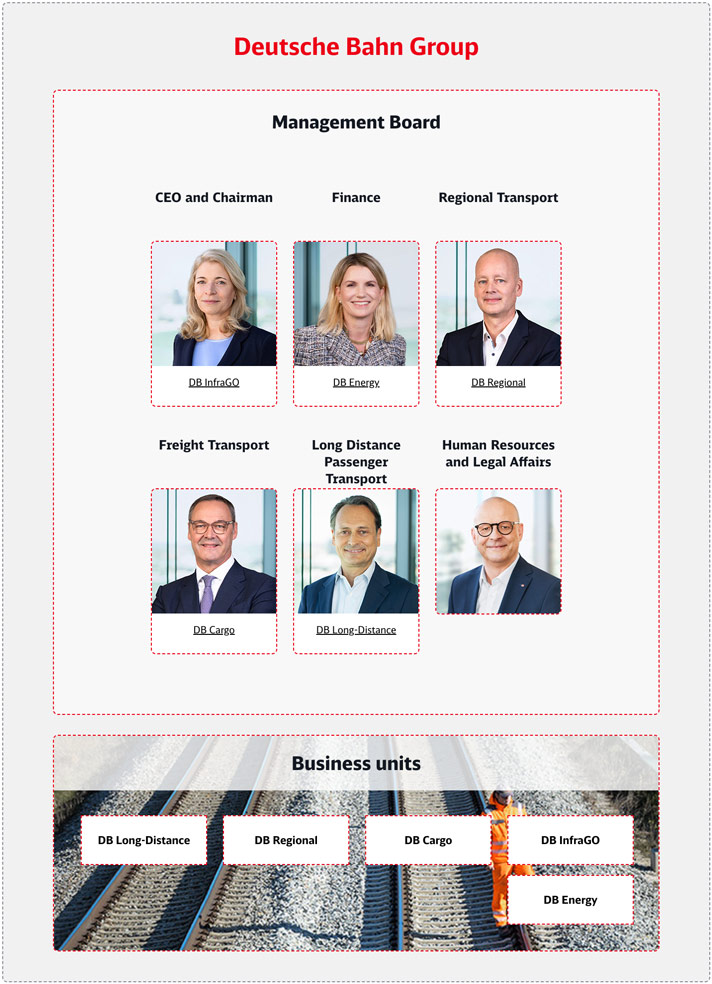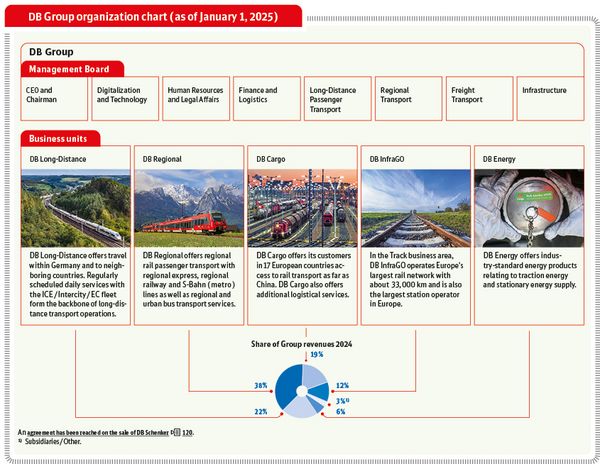About us
DB Group is a leading provider of passenger and freight transport. Our national and international services give us leading market positions in our relevant markets. With a length of about 33,000 km, we operate Europe’s longest rail network. We are also one of the largest energy suppliers in Germany.
There were significant changes to DB Group’s major international subsidiaries in 2024 and 2025:
- The sale of DB Arriva was completed in May 2024.
- The sale of DB Schenker was completed in April 2025.
DB Group, headquartered in Berlin, employs about 223,000 people (excluding DB Schenker). DB AG manages all business units as an operating management holding company and supports the business units through various central Group functions (including legal, corporate development, balance sheets, taxes and insurance, as well as finance and treasury) and administrative service units. In addition, operational service units as legally independent subsidiaries of DB AG primarily provide services for intra-Group customers. These include DB Systel GmbH, DB Sicherheit GmbH, DB Services GmbH and DB Kommunikationstechnik GmbH.
DB Group is focusing on a shift in the mode of transport to rail with its Strong Rail strategy. To this end, we rely on integrated operation of transport and rail infrastructure, the economically and environmentally intelligent linkage of all modes of transport, as well as cooperation in German and European networks. As a prerequisite for the further shift in the mode of transport to rail, the highest priority is to increase operating quality with a view to increasing capacity.
One step towards achieving these goals was the bundling of the infrastructure business areas in the common good-oriented infrastructure company DB InfraGO. DB InfraGO AG is part of DB Group.
The train operating companies (TOCs) in DB Group are legally independent companies with separate balance sheets and statements of income and thus comply with all unbundling requirements under European and national law. There is also a so-called functional unbundling, which guarantees independent decisions by DB InfraGO AG in relation to infrastructure access and fees. Reliability and stability form the basis of a high-quality infrastructure. The key cornerstone of profitable business is the sustainable financing of infrastructure. The Performance and Financing Agreement (Leistungs- und Finanzierungsvereinbarung; LuFV) makes a significant contribution to ensuring that the existing network is maintained. The LuFV is to be further developed into the InfraGO Performance Agreement (LV InfraGO).
Organizational structure
Deutsche Bahn AG (DB AG) is the parent company of DB Group. It has been a stock corporation under German law since it was founded in 1994 and accordingly has a dual management and control structure comprising a Management Board and a Supervisory Board. It is wholly owned by the Federal Republic of Germany (Federal Government).

The business model of DB Group will change as a result of the sale of DB Schenker. In future, we will be focusing our strategy on our core business: our passenger transport activities in Germany, our rail freight transport activities and the rail infrastructure companies. DB Group’s logistics activities, which are bundled at DB Schenker, are thus no longer described in the business model. The main effects that the completion of the planned sale of DB Schenker will have on DB Group are presented in the following chapters: green transformation, employees and business development. DB Group aims to offer attractive, customer-oriented and environmentally friendly mobility and freight transport solutions from a single source. To this end, we want to make targeted use of the potential of digital technologies to improve our operational and administrative processes, continually develop our services for customers, integrate new services and achieve simplifications. We want to successively develop our business portfolio in respect of mobility and freight transport to better satisfy customer needs and meet new market requirements.
- Our passenger transport activities have a broad base. Bus and rail services are supplemented by intelligent networking with other means of transport such as cars and bicycles, but also with new forms of mobility that enable door-to-door mobility in addition to the core business. We offer long-distance rail passenger transport within Germany and into neighboring countries. In bus transport, we focus on the German market. We also offer our supplementary mobility solutions for regional public transport in European countries outside Germany.
- Our business activities in the freight transport market were placed on an international platform at an early stage. DB Cargo operates in the business-to-business segment. In European rail freight transport, we offer our customers industry-specific solutions.
Development of DB Group is largely driven by five success factors that are key components of our business model.
- Corporate social responsibility: As a state-owned provider of mobility and freight transport solutions, DB Group bears great responsibility for the future of our country. As the basis of climate-friendly and networked mobility and the freight transport of tomorrow, rail should fulfill a key function for Germany: it should help to achieve climate protection targets, promote participation and quality of life for people and strengthen the business location as well as people and the economy. In brief: society should benefit from strong rail system. We aim to align our business activities on the realization of Strong Rail in the long-term.
- Powerful organization: Our goal is to ensure DB Group’s effectiveness by establishing a modern and efficient organization and anchoring a value-oriented corporate management.
- Integrated Group: As a system integrator in Germany, we want to optimize the wheel-rail system as a whole and fulfill an important role as a technological pioneer. This is aimed at realizing positive synergies through the integrated Group structure and facilitating the infrastructure so that it is aligned with efficiency, market requirements and profitability. We are committed to developing and implementing the digitalization of rail within the integrated Group structure. Our customers can also benefit from the integrated Group. By linking different modes of transport in an economically, ecologically and technologically intelligent way, we aim to offer our customers door-to-door mobility and transport solutions from a single source.
- Europe as the field of action: As the geographical and economic heart of Europe, Germany has a special responsibility for the future of the continent. Due to the importance of Strong Rail for Europe, Europe remains our field of action in freight transport and cross-border passenger transport.
- Digitalization: We want to use the technologies and methods of digitalization to offer attractive products. This means that, on the one hand, we want to integrate new transport services such as on-demand mobility into our product portfolio and establish platforms for our customer interfaces. On the other hand, we strive to support our internal processes with technologies such as artificial intelligence (AI) to continue to offer customers an appropriate price level with efficient processes. We also intend to make freight transport by rail more attractive through automation and digitalization, for example through Digital Automatic Coupling (DAK).







